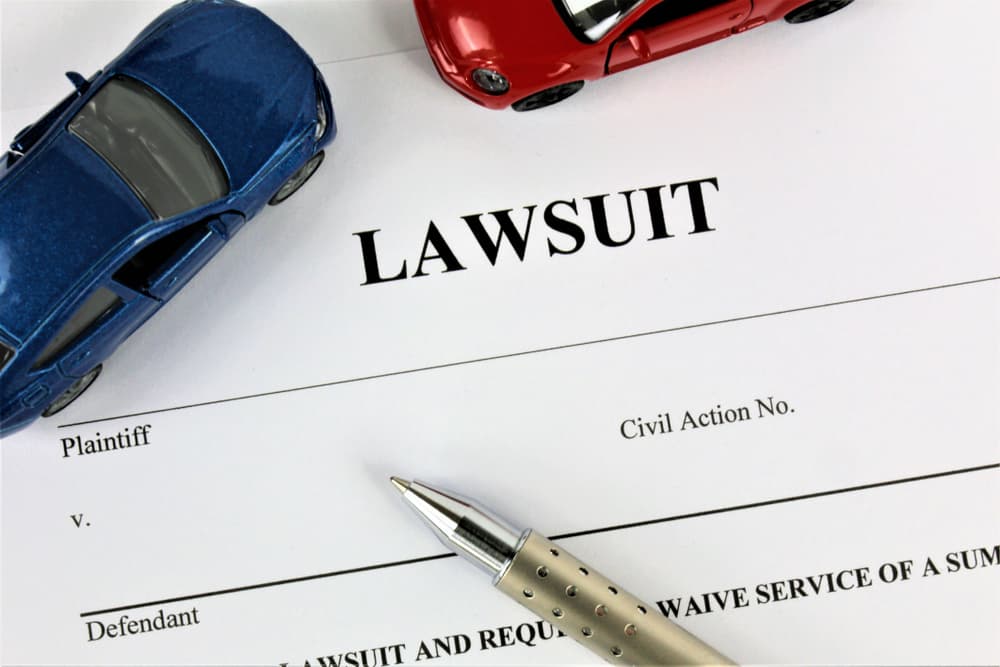
Were you recently in a St. Louis car accident where the fault wasn’t clear or is under dispute? Establishing fault for a car accident is the most important component of an accident claim because it determines who pays for damages. How can you tell who hit who in a car accident to ensure you hold the proper parties accountable and get the money you need?
Read on to explore more about this question and how you can protect yourself throughout the claims process. For specific advice about your situation, contact a car accident attorney near you for a free consultation.
Understanding the Basics of Fault in Car Accidents
In legal terms, fault refers to responsibility or liability for causing an accident. It's not always as simple as pointing a finger at the driver who physically struck the other vehicle. Multiple parties can share fault.
Why does fault matter so much? As mentioned, it’s the cornerstone of the entire claims process.
The at-fault driver (or more accurately, their insurance company) is typically responsible for covering the costs of injuries and property damage resulting from the accident. This includes medical bills, lost wages, vehicle repairs, and even compensation for pain and suffering in more serious cases.
Fault isn't just about money, though. It can affect your driving record, your insurance premiums, and your ability to pursue certain legal actions. That's why you need a knowledgeable attorney to establish fault properly and protect you from undue blame.
Common Car Accident Scenarios and Determining Fault
 Although establishing fault is important for any car accident claim, the process becomes more complicated in certain car crash scenarios:
Although establishing fault is important for any car accident claim, the process becomes more complicated in certain car crash scenarios:
Rear-End Collisions
If you’re sitting at a red light or stop sign, and a driver slams into the back of your car, liability should be straightforward.
In most cases, the driver who rear-ends another vehicle is considered at fault. Drivers must maintain a safe following distance and be prepared to stop if the vehicle in front of them slows down or stops suddenly.
Exceptions to the Rule
However, the front driver might bear some or all of the blame.
For example:
- If the front driver suddenly reverses
- If the front driver's brake lights aren't working
- If the front driver stops abruptly to make a turn but fails to complete the turn
Left-Turn Accidents
You're cruising straight through an intersection when a car making a left turn cuts right in front of you. There's no time to stop, and you T-bone them. Who's at fault?
In most cases, the driver making the left turn is considered at fault. They're required to yield to oncoming traffic and only turn when it's safe.
Exceptions to the Rule
Again, exceptions may apply:
- If the oncoming driver was speeding excessively
- If the oncoming driver ran a red light
- If unforeseen circumstances forced the turning driver to stop mid-turn
Failing to Yield the Right of Way
Following right of way rules keeps traffic flowing smoothly and safely.
When someone fails to yield when they should, accidents happen.
- Blowing through a stop sign or red light is a clear violation of right of way. The driver who failed to stop is typically at fault.
- Merging onto a highway or changing lanes requires careful attention to right of way rules. The merging or lane-changing driver is usually responsible for ensuring it's safe.
Speeding and Reckless Driving
Speed and aggressive driving are often factors in determining fault in accidents.
How Speeding Contributes to Fault
Speeding reduces a driver’s reaction time and increases the severity of accidents. It’s a common factor in many crashes, including left-turn accidents and rear-end collisions.
While your attorney could use proof of the other driver’s speeding to establish fault, you could share part of the blame if authorities determine you were speeding at the time of the crash.
Reckless Driving and Its Effect on Fault Determination
Reckless behaviors like weaving through traffic, tailgating, or driving under the influence can significantly impact fault determination. These actions show a disregard for safety and often lead to increased liability.
Evidence Your Lawyer Can Use to Support Fault Determination
 Determining fault isn't just about who blames who. It's about building a solid case based on concrete evidence. Here are some of the key pieces of evidence your lawyer will look for:
Determining fault isn't just about who blames who. It's about building a solid case based on concrete evidence. Here are some of the key pieces of evidence your lawyer will look for:
Police Reports
When the police respond to an accident, they create an official report.
This document can be incredibly valuable in determining fault. It includes:
- The officer's assessment of what happened
- Any citations issued
- Statements from drivers and witnesses
- Diagrams of the accident scene
Witness Statements
Did anyone see the accident happen? Their account could be crucial in determining fault.
Your lawyer will work to gather statements from:
- Passengers in the vehicles involved
- Bystanders who saw the accident
- Nearby business owners or residents who might have witnessed the crash
Traffic Camera Footage
In today's digital age, you never know who might be watching. Many intersections have traffic cameras that could have caught your accident on film. Also, many stores and shopping centers have surveillance cameras that could have captured the wreck. Your lawyer can work to obtain this footage, providing indisputable evidence of what happened.
Vehicle Damage and Skid Marks
The physical evidence left behind after an accident can tell a story of what happened.
Your lawyer will examine:
- The location and extent of damage on each vehicle
- Skid marks on the road
- The final resting position of the vehicles
This evidence can help reconstruct the accident and determine who hit who.
Admissions of Fault by Drivers
In the heat of the moment, drivers sometimes say things like "I'm so sorry, I didn't see you!" While this might seem like a polite thing to do, it can be used as an admission of fault. Your lawyer will look for any statements drivers make at the scene that could indicate fault.
Factors That Can Affect Fault Determination in Missouri
Missouri follows what's known as a pure comparative fault system. This means that even if you're partially at fault for an accident, you can still recover damages. However, the court will reduce your compensation by your percentage of fault.
This system can get complicated quickly, especially when multiple parties are involved. That’s why you need an experienced attorney on your side. They can help ensure that you're not assigned more fault than you deserve, maximizing your potential compensation.
Seeking Legal Help After a Missouri Car Crash
You might be thinking, "Do I really need a lawyer? Can't I just handle this on my own?"
That could be a costly mistake.
An attorney has the knowledge and experience to handle the nuances of car accident claims along with the resources necessary to build a strong case for you.
While you need an attorney’s help no matter how serious the situation, there are times when you absolutely must have an attorney to get the best outcome possible:
- If someone disputes fault: If the other driver or their insurance company is trying to pin the blame on you, you need someone in your corner who knows how to fight back.
- If you suffered serious injuries: Serious injuries often lead to significant medical bills, lost wages, and long-term effects. An experienced attorney can help ensure you're fully compensated for all of these damages.
- If the insurance company has denied your claim or is giving you the runaround: Insurance companies are in the business of making money, not paying out claims. If they're not treating you fairly, an attorney can step in and hold them accountable. Insurers have teams of high-priced lawyers working for them, so you need a lawyer to level the playing field and push back on their attempts to blame you for the crash or devalue your claim.
Even if none of these situations apply to you, it's still a good idea to at least consult a car accident injury lawyer after a crash. Many offer free initial consultations, so you have nothing to lose. They can help you understand your rights, evaluate the strength of your case, and make sure you're not leaving money on the table.
How Long You Have to File a Car Accident Lawsuit in Missouri
 Time is of the essence when it comes to car accident claims. In Missouri, you generally have five years from the accident date to file a personal injury lawsuit.
Time is of the essence when it comes to car accident claims. In Missouri, you generally have five years from the accident date to file a personal injury lawsuit.
Five years might seem like a long time, but it can fly by faster than you think, especially when you're dealing with injuries and trying to get your life back on track. Plus, the longer you wait, the harder it can be to gather evidence and build a strong case.
If you're filing a claim against a government entity (like if your accident involved a city bus), you might have a much shorter window to file – sometimes as little as 90 days. Insurance companies often have their own deadlines for filing claims as well, which can be far shorter than the legal statute of limitations.
If you fail to have a lawyer file a claim for you within Missouri’s statute of limitations or any other deadlines that apply to your case, you’ll probably lose your right to pursue compensation.
The bottom line: Don't wait. Even if you're unsure whether you want to pursue legal action, you must consult an attorney as soon as possible after your accident. This ensures you keep all your options open and don't accidentally miss any critical deadlines.
Contact an Experienced Car Accident Attorney Right Away
The sooner you act and contact a car accident lawyer about your case, the better the chances your attorney can collect the necessary evidence to establish fault and build a strong compensation case for you.
At Gray Ritter Graham, we've been helping Missouri car accident victims for more than 75 years. We know the ins and outs of the legal system, we understand how insurance companies operate, and we're committed to fighting for the compensation you deserve.
To date, we’ve recovered more than $7 billion in verdicts and settlements for our clients. While we can’t guarantee results, we can promise to do all we can to maximize your financial recovery.
Don't let confusion about who hit who in your car accident keep you from getting the justice and compensation you deserve. Don't let the insurance companies push you around or pressure you into accepting a lowball offer. Don't try to navigate this complex process on your own.
Contact personal injury attorney at Gray Ritter Graham today at (314) 241-5620 for your free, no-obligation consultation. We’ll review your case and inform you of your rights and options. If we decide to move forward together, you can rely on us for personalized attention and assertive advocacy throughout every stage of the process to increase your chances of getting the best results possible.

 RSS Feed
RSS Feed